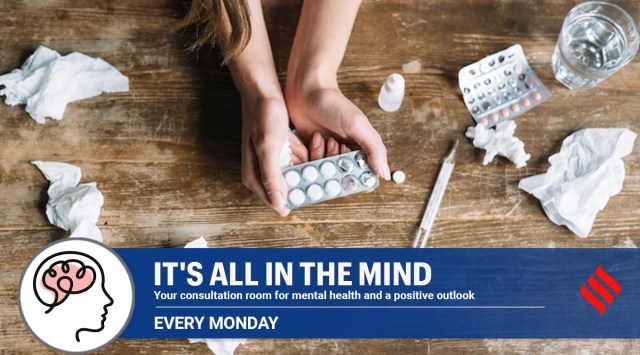Antidepressants: Who needs it, who doesn’t? So, don’t go overboard
Depression can vary in severity, ranging from mild, moderate and severe, depending on the cause. Mild to moderate depressive episodes don’t require antidepressants and can be taken care of by cognitive behavioural therapies, says Dr Harsha GT, Consultant-Psychiatrist, Manipal Hospital, Bengaluru.
 Mild to moderate depressive episodes may not always require the need of antidepressants. (Source: Freepik)
Mild to moderate depressive episodes may not always require the need of antidepressants. (Source: Freepik) What many people do not realise is that feeling low once in a while may not be synonymous with depressive disorder or depression. Depression comprises low moods most of the day, low energy and loss of interest in previous pleasurable activities associated with sleep and appetite disturbances, impaired attention/concentration, forgetfulness, low on self-esteem and confidence, feeling of worthlessness, hopelessness and helplessness with or without suicidal ideations. All these symptoms have to be present for a minimum of two weeks. So, treating depression with antidepressants mostly depends on the cause and severity of the illness.
Does depression happen to be severe all the time?
NO! Depression can vary in severity, ranging from mild, moderate or severe, depending on the cause. This is usually graded, depending on the kind of presenting symptoms and duration, which are usually decided by the clinical expertise or objective rating scales. Mild to moderate depressive episodes may not always require the need of antidepressants. It can be handled effectively with psychotherapies especially CBT (Cognitive Behavioural Therapy) and regular aerobic exercises (natural antidepressant), yoga and relaxation exercises.
But when depression is moderate to severe, antidepressants are strongly indicated without which patients may not be able to get out of their troughs. Also, we may be able to prevent all major and minor complications that can happen out of depression, which includes suicide, catatonia and various other complications.
How medication depends on the cause
Using antidepressants also depends on the cause of depression. Depression can arise out of various causes/precipitating factors listed below:
• Genetic: Family history of depression may increase the risk
• Gender: Women are at a higher risk of developing depression as they undergo hormonal fluctuations which may include pre-menstrual symptoms, pregnancy, postpartum, postmenopausal symptoms and so on.
• Organic: Due to traumatic brain injuries, cerebrovascular strokes, epilepsies, Parkinson’s and other neurological disorders
• Hormonal problems like hypothyroidism, PCOS, diabetes
• Drug-induced: Corticosteroids, certain anti-epileptics, antidepressants, Isotretinoin (used to treat acne) etc
• Substance abuse: Alcohol, cannabis
• Grief/ bereavement
• Personality disorders
• Psychosocial stressors or major life events: These may include problems in relationships, work, finance, childhood abuse and chronic pains to name a few.
When to prescribe antidepressants?
Specific psychotherapies like CBT, supportive psychotherapy, DBT (Dialectical Behavioural therapy), grief therapy, IPSRT (interpersonal and social rhythm therapy) with complementary exercise, yoga, mindfulness and other relaxation techniques may be enough to alleviate the illness when symptom severity is less or when it is a secondary problem. The last usually happens because of a lack of problem-solving skills due to personality disorders, adjustment disorder, grief and various other psychosocial stressors. Psychotherapies may not be effective in organic mood disorders where antidepressants play a major role.
Stopping the offending agent may be enough to treat certain drug-induced depressive disorders. This applies even in substance-induced mood disorders. Just helping the patient to get out of dependence is enough to treat the mood disorder.
Mood disorders secondary to hormonal deficiencies (Eg; hypothyroidism), which may improve with necessary hormonal corrections and antidepressants, are indicated only if the symptoms are severe or not responding to hormonal supplements.
Premenstrual symptoms may not need antidepressants until it’s severe enough (PMDD- Premenstrual dysphoric disorder) to cause major interpersonal problems and severe depression. Not all antidepressants may be safe to be used during pregnancy and lactation, planning effective psychotherapies may benefit. Antidepressants may be used after weighing the risks and benefits.
Antidepressants are also indicated for anxiety disorders, panic disorder, phobic disorder, OCD (Obsessive compulsive disorder), ADHD (Attention Deficit Hyperactivity disorder), sexual disorders.
Use of antidepressants is usually a clinical decision, which mostly depends on the severity of the illness. The decision of starting it is made after explaining the risks and benefits to the patient. In the last two decades, there have been inventions of various antidepressants which are best in their efficacy and side effect profile. Antidepressants bring down the burden of the disease and also prevent complications and recurrence. They may not be necessary for a lifetime and can be tapered and stopped when the disease is under control.
(The author is the Secretary of Indian Psychiatric Society South Zonal Branch)



- 01
- 02
- 03
- 04
- 05



























